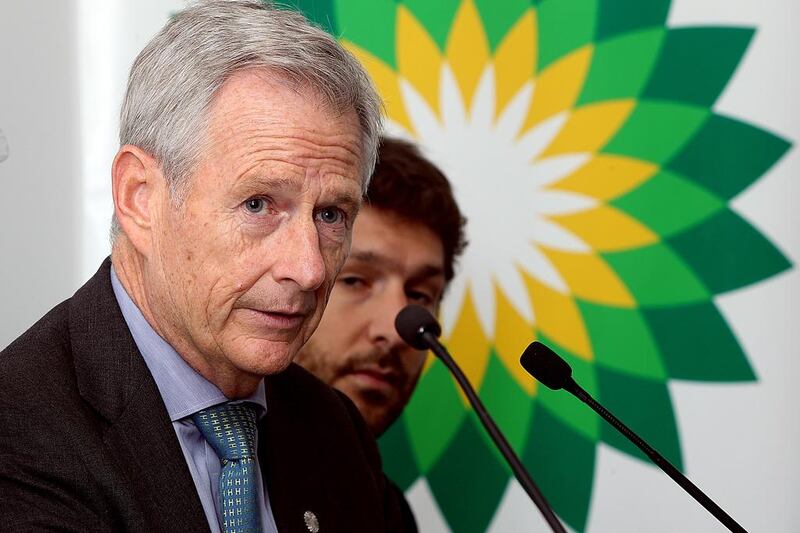BP is waiting for an answer about a substantial bid it has made for an equity stake in the company that develops Abu Dhabi's main onshore oilfields.
The old concession for Abu Dhabi Company for Onshore Petroleum Operations (Adco), in which BP had a 9.5 per cent stake, expired nearly two years ago. Abu Dhabi’s Supreme Petroleum Council (SPC) still has to make a decision on 22 per cent of the shareholding in the new Adco, in which shareholders will have rights to an equity share of the oil through 2055.
“We did put in a substantial bid and there obviously still is some outstanding equity there,” said Michael Townshend, the head of the Middle East region for BP.
Separately, BP does not expect to see production growth from its giant Rumaila oilfield in southern Iraq unless there is a solution to budget negotiations with Iraq, which are currently bogged down.
In Abu Dhabi, it had not been clear what companies remained interested in a stake after France’s Total won an initial 10 per cent share last January, as well as a mandate to lead development of the two most sought after of Adco’s 15 major oilfields, the South-east field and Bu Hasa integrated group of fields.
After Total's win, Abu Dhabi National Oil Company (Adnoc), which owns 60 per cent of Adco and is advising the SPC on the concession, asked those from its first-round shortlist to resubmit bids matching Total's commercial and technical terms.
BP and Royal Dutch Shell, which also had a 9.5 per cent stake in the old company, have indicated they remain interested and both are likely to have bid for 10 per cent stakes, for which Total paid US$2.2 billion, according to industry sources. The French company also submitted proposals to reach Adnoc’s demanding target of 70 per cent recovery of oil from the reservoirs, or doubling the highest rates in major oilfields historically.
In spring, Adnoc awarded 5 per cent and 3 per cent stakes to Japan’s Inpex and Korea’s GS Energy respectively, recognising Abu Dhabi’s two largest and most consistent oil-buying countries. China also remains interested in securing a stake for one of its state oil firms.
“There was the first round and a second round … for Adco. [Adnoc] did make the framework, we did make our bid and have some discussions and it is in their hands now,” said Abdulkarim Al Mazmi, the head of BP in Abu Dhabi.
Adnoc said in January that it would resolve the issue soon, but it has dragged on as oil prices have plunged to post-financial crisis lows this year.
BP in fact “still have a few ‘secondees’ in Adco although we are not yet an equity holder”, Mr Al Mazmi added, referring to employees it already has working on projects for the onshore oil operator.
He said BP is also keen to develop their offshore interests in Abu Dhabi, noting that the company has the largest number of employees working in Adma-Opco, Abu Dhabi’s offshore oil company. Mr Al Mazmi said BP would add a few more this year to bring the total of its staff in Adma-Opco to 50.
Adnoc is targeting overall growth in oil output capacity from 2.7 million barrels per day at the end of last year to 3.5 million bpd by the end of 2017, with 1.8 million bpd coming from onshore fields and 1.7 million bpd from offshore.
In Iraq, which is BP’s largest interest in the region via its technical services deal with partner PetroChina to develop the giant Rumaila oilfield, progress is stalled by the Iraq government’s dire financial situation, said Mr Townshend.
Iraq has been negotiating this year for new deals.
Mr Townshend said it did not look likely that a deal with the government would be reached on investment to raise production from this year’s average of about 1.3 million bpd.
This year’s total budget for Rumaila is estimated to be $2.5bn, of which BP is obliged to spend 47.6 per cent, its partner PetroChina 46.4 per cent and Iraq’s State Oil Marketing Organisation 6 per cent.
For next year’s Rumaila spending budget, “we’ll tailor that according to what Iraq thinks it can repay”, Mr Townshend said.
amcauley@thenational.ae
Follow The National's Business section on Twitter





